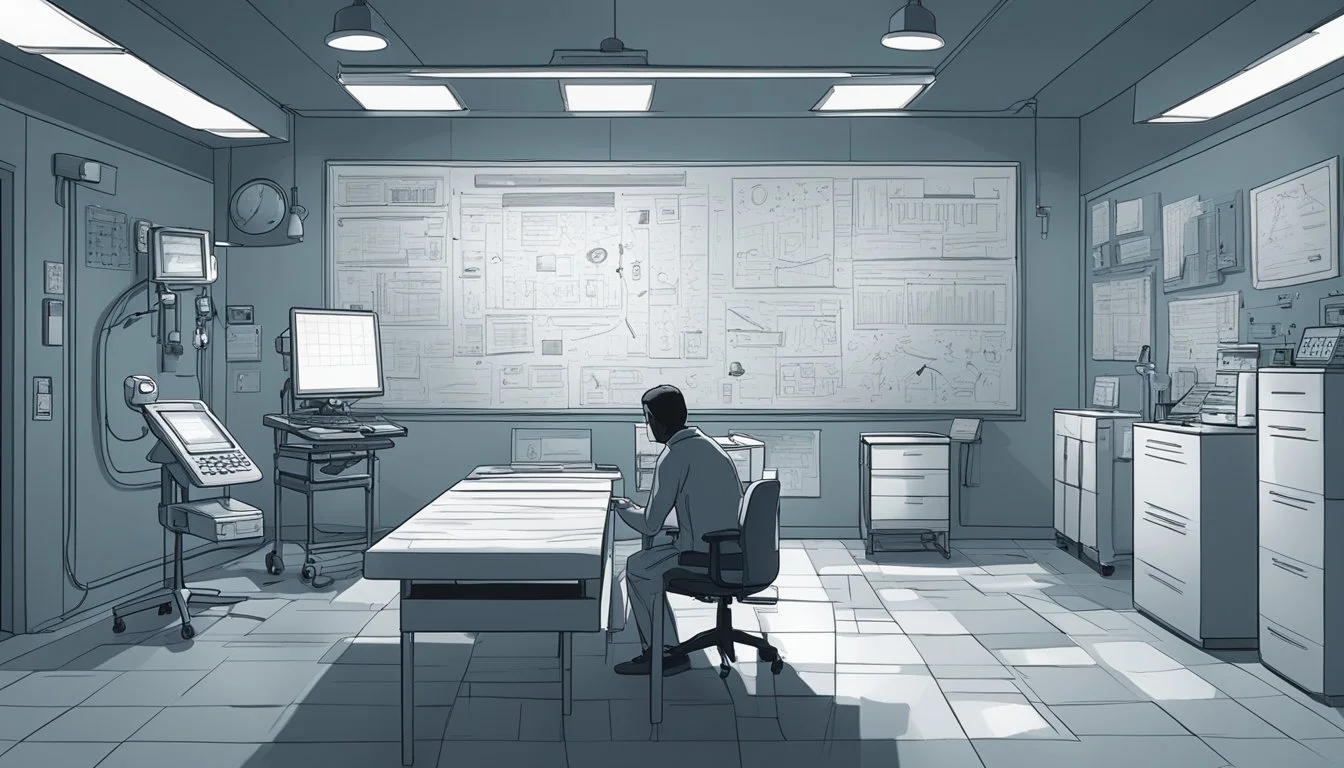Analyzing Dr Gregory House as a Fictional Sociopath
The hit medical drama House MD captivated audiences with its enigmatic lead character, Dr. Gregory House. Known for his brilliant diagnostic skills and abrasive personality, House often displayed traits associated with sociopathy. His lack of empathy, manipulation of others, and disregard for social norms raised questions about his mental state throughout the series.
House's character challenged viewers to consider the fine line between genius and sociopathy in the medical field. While his unconventional methods often saved lives, they also strained relationships and pushed ethical boundaries. The show explored how a brilliant doctor could function effectively despite possessing traits typically seen as detrimental in healthcare.
House's interactions with patients suspected of being sociopaths provided intriguing storylines that delved into the nature of empathy and human connection. These episodes highlighted the complexities of diagnosing and treating individuals with antisocial personality disorders, while also serving as a mirror for House to examine his own behavior and motivations.
Character Overview: Dr. Gregory House
Dr. Gregory House is a brilliant yet deeply flawed medical genius. His unparalleled diagnostic skills are matched only by his abrasive personality and complex relationships with those around him.
Gregory House as a Diagnostician
Dr. House's diagnostic abilities are legendary. He approaches medical mysteries with a keen intellect and unconventional methods. House often relies on deductive reasoning and his vast medical knowledge to solve cases that baffle other doctors.
His process typically involves brainstorming with his team, ordering numerous tests, and making intuitive leaps. House's willingness to take risks and try experimental treatments sets him apart from more cautious practitioners.
Despite his genius, House's addiction to Vicodin sometimes clouds his judgment. This dependency stems from chronic leg pain, adding a layer of complexity to his character and medical practice.
House's Relationships with his Team
House's interactions with his diagnostic team are marked by tension and occasional moments of respect. He frequently berates and belittles his colleagues, testing their limits and pushing them to think outside the box.
Dr. James Wilson serves as House's closest friend and moral compass. Their relationship is characterized by banter, mutual support, and occasional conflict.
House's romantic entanglements, particularly with Dr. Lisa Cuddy, are tumultuous. His inability to fully open up emotionally creates barriers in his personal life.
The team's dynamics evolve throughout the series, with members coming and going. House's mentorship style, while harsh, often brings out the best in his proteges.
Comparison to Real-life Medical Professionals
While Dr. House's diagnostic skills are exaggerated for dramatic effect, his character draws inspiration from real medical professionals. His deductive approach mirrors that of Sir Arthur Conan Doyle's Sherlock Holmes, who was based on Dr. Joseph Bell, a renowned diagnostician.
House's disregard for rules and unorthodox methods would be highly problematic in a real hospital setting. His lack of empathy and frequent ethical violations contrast sharply with the expected behavior of medical professionals.
Some aspects of House's practice, such as the importance of thorough patient histories and considering rare conditions, align with real medical practices. However, his solo diagnoses and risky treatments are unrealistic in modern healthcare.
Exploring Sociopathy in 'House MD'
The character of Dr. Gregory House exhibits many traits associated with sociopathy. His behavior and interactions provide a compelling case study for examining antisocial personality traits in a medical drama setting.
Defining Sociopathy and its Traits
Sociopathy falls under the umbrella of antisocial personality disorder. Individuals with this condition often display a disregard for social norms and the rights of others.
Key traits include:
Lack of empathy
Manipulative behavior
Disregard for rules and laws
Impulsivity
Superficial charm
In 'House MD', the titular character demonstrates many of these qualities. His brilliance as a diagnostician is often overshadowed by his callous attitude towards patients and colleagues.
House's Antisocial Behavior
Dr. House frequently flouts hospital rules and social conventions. He manipulates both patients and staff to achieve his goals, often without consideration for their feelings or well-being.
Examples of House's antisocial behavior include:
Lying to patients
Performing unauthorized procedures
Insulting colleagues and superiors
Breaking into patients' homes
His actions, while often leading to correct diagnoses, create chaos in the hospital environment. House's behavior strains relationships and tests ethical boundaries in medicine.
Lack of Empathy and Remorse
House's apparent lack of empathy is a central aspect of his character. He treats patients as puzzles to be solved rather than individuals deserving compassion.
This detachment allows House to make difficult decisions without emotional interference. However, it also leads to conflicts with his team and administration.
House rarely expresses genuine remorse for his actions. When confronted, he often deflects with sarcasm or rationalizes his behavior as necessary for patient care.
His emotional responses appear muted or absent in situations where others would show distress. This trait aligns closely with the emotional deficits seen in sociopathy.
Notable Episodes and Storylines
House M.D. featured several episodes that shed light on House's complex character and relationships. These storylines explored his emotional depth and professional dynamics.
Valerie's Case and House's Emotional Response
In the episode "Three Stories," House recounts a pivotal case involving a patient named Valerie. Her misdiagnosis led to unnecessary leg amputation, paralleling House's own medical history. This case deeply affected House, revealing his vulnerability and guilt.
House's treatment of Valerie showcased his exceptional diagnostic skills but also his emotional detachment. The episode highlighted how past experiences shaped his approach to medicine and pain management.
House's Dynamic with Wilson and Cuddy
House's relationships with Dr. James Wilson and Dr. Lisa Cuddy were central to the series. Wilson acted as House's conscience and closest friend, often challenging his unethical behavior.
Cuddy, as Dean of Medicine, frequently clashed with House over his unconventional methods. Their complex dynamic evolved from professional tension to romantic involvement.
These relationships provided insight into House's character, revealing his capacity for loyalty and emotional connection despite his abrasive exterior.
Psychological Analysis and Theories
Dr. Gregory House's complex psychological profile offers fascinating insights into addiction, pain management, manipulative behaviors, and personality disorders. His character exemplifies several intricate psychological concepts and theories.
House's Addiction and Pain Management
House's chronic leg pain and subsequent addiction to Vicodin form a central aspect of his psychological makeup. His pain serves as both a physical and emotional barrier, influencing his decision-making and interpersonal relationships. The addiction stems from a need to manage his constant discomfort, but it also acts as a coping mechanism for deeper emotional issues.
House's reliance on painkillers affects his cognitive abilities and mood, often leading to erratic behavior. His struggle with addiction highlights the complex interplay between physical pain, psychological dependence, and the pursuit of relief. This cycle reinforces his isolation and cynicism, further complicating his ability to form meaningful connections with others.
Machiavellian Strategies in House's Choices
House frequently employs Machiavellian tactics in his professional and personal life. These strategies involve manipulation, deceit, and a focus on ends justifying means. He often lies to patients, colleagues, and even friends to achieve his desired outcomes.
His approach reflects a belief that conventional morality is ineffective in solving complex medical cases. House's Machiavellian tendencies manifest in:
Manipulating team members to test theories
Deceiving patients to obtain consent for risky procedures
Using psychological tactics to extract information
These behaviors stem from a combination of his brilliance, distrust in others, and a pragmatic view of ethics in medicine.
Sociopathy Versus Psychopathy
House's character traits align with aspects of both sociopathy and psychopathy, though he doesn't fully fit either diagnosis. He displays sociopathic tendencies through his disregard for social norms and lack of empathy in many situations. His manipulative behaviors and apparent lack of remorse also point towards sociopathic traits.
However, House's occasional displays of genuine care and his ability to form selective attachments suggest he is not a true psychopath. His behavior might be better explained as a combination of:
Antisocial personality traits
High-functioning autism spectrum disorder
Narcissistic tendencies
These traits, combined with his genius-level intellect, create a unique psychological profile that defies simple categorization.
Supporting Characters and Their Roles
Supporting characters play crucial roles in shaping Gregory House's interactions and development throughout the series. Their relationships with House provide insight into his complex personality and motivations.
Dr. Lisa Cuddy's Influence
Dr. Lisa Cuddy serves as House's boss and foil. As Dean of Medicine, she frequently clashes with House over his unorthodox methods and behavior.
Cuddy's efforts to rein in House's excesses create tension and conflict. She balances supporting his medical brilliance with enforcing hospital rules.
Their relationship evolves from professional antagonism to romantic involvement. This shift adds depth to both characters, revealing vulnerabilities beneath their tough exteriors.
Role of Dr. Remy 'Thirteen' Hadley
Dr. Remy Hadley, known as "Thirteen," joins House's diagnostic team in season four. Her mysterious demeanor and Huntington's disease diagnosis intrigue House.
Thirteen's bisexuality and terminal illness challenge House's assumptions. Their interactions highlight his struggle to understand emotional complexity.
As a fellow damaged soul, Thirteen often sees through House's defenses. Her willingness to take risks in both her personal and professional life resonates with House's own tendencies.
Interactions with Patients and Co-workers
House's interactions with patients and co-workers reveal his sociopathic tendencies and brilliance. He often manipulates patients to obtain information or compliance.
With co-workers, House employs sarcasm and insults as defense mechanisms. His team members learn to navigate his abrasive personality to access his medical expertise.
House's lack of empathy frequently clashes with ethical norms. This creates moral dilemmas for his colleagues, forcing them to question their own values and practices.
Despite his behavior, House's ability to solve medical mysteries earns grudging respect. His co-workers often serve as ethical counterweights, challenging his more extreme actions.
Cultural Impact and Audience Reception
"House MD" left an indelible mark on television and popular culture. The show's unique portrayal of a brilliant but flawed protagonist sparked discussions about medical ethics, human behavior, and the nature of genius.
Critical Acclaim and Criticism
"House MD" garnered widespread critical acclaim during its eight-season run. The show received numerous awards, including five Primetime Emmy Awards and two Golden Globes. Critics praised the complex storytelling, innovative medical mysteries, and Hugh Laurie's captivating performance as Dr. Gregory House.
Some reviewers, however, criticized the show's formulaic structure and occasional medical inaccuracies. The series also faced scrutiny for its depiction of hospital practices and doctor-patient relationships.
Despite these critiques, "House MD" maintained a dedicated fanbase and consistently high ratings throughout its run.
House MD's Influence on Television
"House MD" revolutionized the medical drama genre. Its success paved the way for a new wave of shows featuring morally ambiguous protagonists and complex character dynamics.
The series popularized the "brilliant jerk" archetype in television, inspiring characters in subsequent shows like "Sherlock" and "The Good Doctor." Its innovative approach to medical mysteries also influenced other medical dramas.
"House MD" pushed boundaries in storytelling, tackling controversial topics and exploring the darker aspects of human nature. This approach set a new standard for mature, thought-provoking television content.
Reactions to Portrayal of Sociopathy
Dr. House's character, often described as exhibiting sociopathic traits, sparked debates among viewers and mental health professionals. Many praised the show for its nuanced portrayal of a complex, flawed individual.
Some mental health experts argued that House's behavior more closely aligned with Antisocial Personality Disorder rather than true sociopathy. This distinction led to discussions about the accurate representation of mental health conditions in media.
Viewers were divided in their reactions. Some found House's behavior entertaining and intriguing, while others criticized the glorification of potentially harmful personality traits.
The show's portrayal of sociopathy raised awareness about mental health issues and challenged societal perceptions of genius and social norms.
Behind the Scenes
The creation of House MD involved intricate writing, carefully selected actors, and meticulous production. These elements combined to bring the complex world of Dr. Gregory House to life on screen.
Writing and Development
The writers of House MD crafted intricate medical mysteries and character arcs. They researched rare diseases and consulted with medical professionals to ensure accuracy. The show's creators focused on developing House's abrasive personality and brilliant diagnostic skills.
Hugh Laurie's portrayal of House was heavily influenced by the writers' vision. They tailored scripts to showcase his sarcastic wit and unconventional problem-solving methods.
The team also worked to balance the medical cases with ongoing character development. This approach kept viewers engaged with both the episodic mysteries and overarching storylines.
Casting and Performance
Hugh Laurie's casting as Dr. Gregory House was crucial to the show's success. Initially, the producers were looking for an American actor. Laurie, a British comedian, impressed them with his audition tape.
Laurie adopted an American accent for the role, fooling even the show's creator. His performance brought depth to House's complex character, blending humor with dramatic intensity.
The supporting cast was carefully selected to complement Laurie's portrayal. Actors like Robert Sean Leonard and Lisa Edelstein were chosen for their ability to hold their own against House's forceful personality.
Production and Filming Insights
House MD's production team created a realistic hospital environment on set. They paid attention to medical equipment details and hospital procedures to maintain authenticity.
The show's distinctive visual style involved unique camera angles and lighting techniques. These elements enhanced the dramatic tension during diagnostic scenes and character interactions.
Filming often involved long hours, especially for complex medical sequences. The cast underwent basic medical training to perform procedures convincingly on camera.
Special effects were used sparingly, mainly for visualizing internal medical conditions. This approach helped maintain the show's grounded, realistic feel despite its often extraordinary cases.
Analysis of Real-world Implications
"House MD" raises important questions about sociopathy in medicine, diagnostic accuracy, and public perceptions of doctors. Its portrayal of an unconventional physician challenges viewers to examine healthcare norms and ethics.
Medical Accuracy in 'House MD'
The show's medical cases often stretch credibility for dramatic effect. While some diagnoses and treatments align with real practices, many are exaggerated or implausible. The rapid pace of testing and results rarely reflects actual hospital timelines.
House's diagnostic methods, though unorthodox, emphasize the importance of thorough investigation and considering rare conditions. His team's brainstorming sessions mirror real differential diagnosis processes, albeit in a condensed format.
The show's depiction of medical technology is generally accurate, showcasing advanced imaging and lab techniques. However, the ease of access to these resources doesn't always reflect real-world constraints in many hospitals.
Sociopathy in the Medical Field
House's sociopathic tendencies raise ethical concerns about patient care and professional conduct. His lack of empathy and disregard for rules contrast sharply with medical ethics taught in medical schools.
In reality, doctors with antisocial traits face significant barriers in practice. Medical licensing boards and hospital ethics committees closely monitor physician behavior to ensure patient safety and appropriate care.
The show highlights the potential benefits of unconventional thinking in diagnosis. However, it downplays the crucial role of empathy and bedside manner in effective treatment and patient trust.
House's Influence on Public Perception
"House MD" has significantly impacted public views of doctors and healthcare. The show's popularity led to increased interest in diagnostic medicine and rare diseases among viewers.
House's character reinforced stereotypes of brilliant but difficult doctors, potentially affecting patient expectations. His methods sometimes glamorized risky or unethical practices, which could mislead viewers about appropriate medical care.
The show sparked discussions about patient rights, medical ethics, and the balance between innovative thinking and established protocols in healthcare. It challenged viewers to consider the complexities of medical decision-making and the human aspects of treatment.
Conclusion
Dr. Gregory House exhibits numerous traits associated with sociopathy. His lack of empathy, disregard for social norms, and manipulative behaviors align with common characteristics of antisocial personality disorders.
House's brilliant medical skills and unconventional methods often yield results, but come at a personal cost. His relationships suffer due to his inability to form genuine emotional connections.
The portrayal of House raises questions about the line between genius and mental illness. It challenges viewers to consider how society treats those who don't conform to expected social behaviors.
While House displays sociopathic tendencies, he also shows moments of vulnerability and growth throughout the series. This complexity makes him a compelling character study in television drama.
The show's exploration of House's personality offers insights into the nature of sociopathy and its impact on both the individual and those around them. It demonstrates how such traits can be both advantageous and destructive in professional settings.
Ultimately, House MD presents a nuanced depiction of a character with sociopathic traits, inviting audiences to reflect on the complexities of human behavior and mental health.






